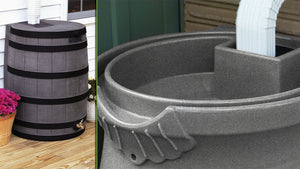State Regulations for Rain Barrels in 2022
March 25, 2022

Rain Barrels are legal for use in all 50 states, with a few specific regulations you need to follow.
Water laws are handled at the state level, meaning that some states have specific regulations when it comes to rainwater storage, such as using a rain barrel in your backyard. For the most part, rain barrels for use at home are legal to use.
Always check with your local government to ensure that you aren’t violating any regulations and that your game plan for collecting rainwater is safe for you and the environment!
The main reason for these regulations being in place is ecosystem protection and health safety. Most states have regulations in place simply to encourage the safe practice of not drinking the rainwater that you collect. Ecosystem disruption is mainly a concern in states that don’t receive much rainfall or heavy drought seasons. This is because rainwater that is collected and stored is water that won’t be recycled into the water shed. If you stick to the regulations, you won’t cause any damage though!
These are states that don’t have strict rain barrel regulation, remember to always do your research on placement and design of a rain barrel harvesting system.
No Regulations For Rain Barrel Use
- Alabama
- Alaska
-
Arizona - offers incentives
- Connecticut
- Delaware
-
Florida - offers incentives
-
Hawaii - offers incentives
- Idaho
- Indiana
- Iowa
- Kentucky
- Louisiana
- Maine
-
Maryland - offers incentives
- Massachusetts
-
Michigan - offers incentives
-
Minnesota - offers incentives
- Mississippi
- Missouri
- Montana
- Nebraska
- New Hampshire
-
New Jersey - offers incentives
-
New Mexico - offers incentives
- New York
- Oklahoma
- Rhode Island
- Texas
- Pennsylvania
- South Carolina
- South Dakota
- Tennessee
- Vermont
- Wyoming
This is a rough description of the regulations in place in these states. Remember to always check with your local authorities if you are looking to use a rain barrel in one of these states!
Regulations For Rain Barrel Use
- Arkansas
- California
- Rain barrels are allowed when harvesting from a roof
- Colorado
- Only two rain barrels, with a combined capacity of 110 gallon
- Only for use in the lawn or garden where it was harvested
- Non-Potable Only
- Georgia
- Must be used for outdoors only
- Illinois
- Must be regulated by a homeowner’s association
- Non-potable only
- Must comply with Illinois Plumbing Code
- Kansas
- Requires a permit for over 2 acres of lawn or garden
- Nevada
- Must be collected from a single-family dwelling above-ground rooftop
- Must be used for non-potable domestic use only
- Must not conflict with existing water rights
- Storage capacity must be 20,000-gallons or less
- Capture area must be an acre or less
- North Carolina
- North Dakota
- Ohio
- Potable and non-potable if it is used by fewer than 25 people
- Oregon
- Rain Barrels are allowed when harvesting from a roof
- Legal advice should be sought before attempting to construct any system on private property
- Utah
- The State of Utah authorizes the direct collection of rainwater on land owned or leased by the person responsible for the collection.
- No more than 2 barrels and they can’t be larger than 100 gallons
- Virginia
- Non-Potable only or outdoor uses
- Washington
- It's used on the property from which it was collected
- It's collected on an existing rooftop
- West Virginia
- Non-Potable only or outdoor uses
- Wisconsin
- The rain barrel must be stored above ground
- The rainwater system must not be directly connected to the public water supply
- Non-Potable only or outdoor uses
Shop All Rain Barrels
